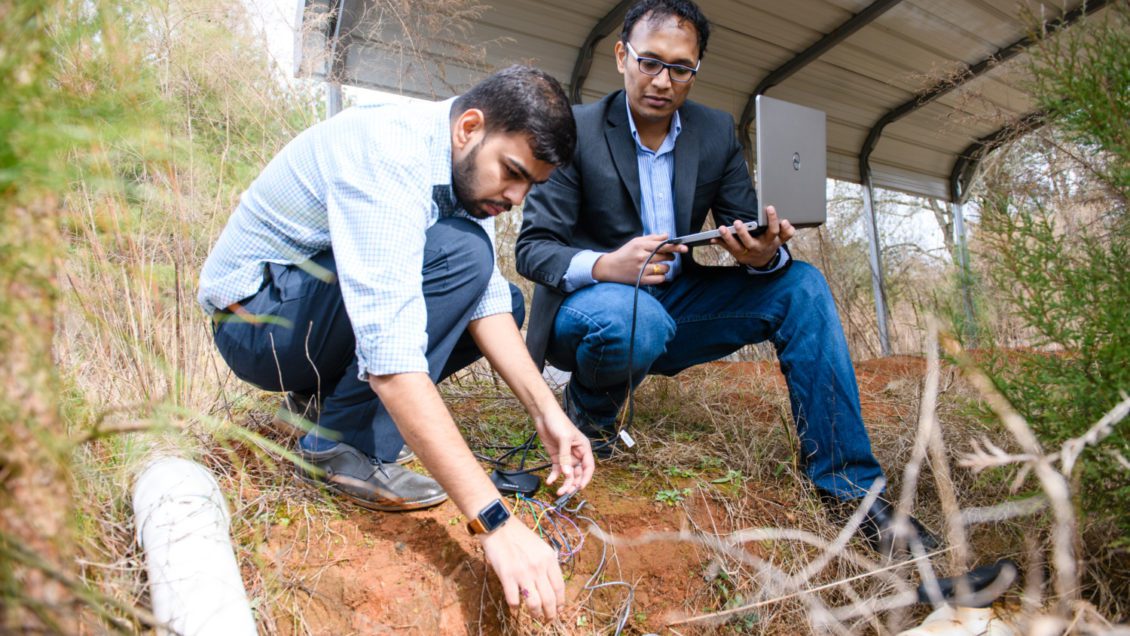Kalyan Piratla opened a laptop computer while civil engineering Ph.D. student Harshit Shukla squatted next to a PVC pipe installed in a shallow trench about a mile from Clemson University’s main campus.
Piratla and Shukla were demonstrating research that could allow utilities to continuously monitor water pipelines for leaks in near real-time without having to dig up several blocks of city streets.

This project and others like it have helped Piratla win the Ralston Young Trenchless Achievement Award from the North American Society for Trenchless Technology, or NASTT for short.
Piratla, the S.E. Liles, Jr. Distinguished Associate Professor of Civil Engineering, heads to Denver in April to accept his award at NASTT’s annual No-Dig Show.
“I feel honored and humbled,” he said. “It’s given to one person in North America every year, and this year it’s me. I thank my nominators and NASTT for making this honor possible.”
The award honors society members who are under 36 years old and “have demonstrated excellence early in their career by making valuable contributions to the trenchless technology industry, achieving noteworthy professional success, and actively participating in NASTT or its regional or student chapters,” according to NASTT.
Piratla has secured more than $1.5 million in research funding in a lead investigator role from a variety of agencies and has published more than 55 peer-reviewed research papers.
As part of one recently completed project, Piratla and his team installed vibration sensors on pipes to detect leakages. Artificial intelligence they designed was able to tell from the vibrations whether the pipe was leaking and how severe it was.
The potential impact is huge. Miles of pipeline carry treated drinking water to customers’ homes and businesses. Many of those pipes are aging and corroded and need to be replaced or rehabilitated.
As much as 20 percent of drinking water is lost to leakage, Piratla said.
His research is part of a growing movement towards “trenchless technology” that allows installation, replacement or rehabilitation of underground pipeline infrastructure with a minimum amount of excavation, Piratla said.
“It could sometimes be more expensive, but when you consider the environmental and societal benefits, trenchless technology is the clear winner,” Piratla said.
Fewer trucks and less excavation equipment are needed when trenchless technology is used, which results in fewer carbon emissions that have been linked to climate change, Piratla said.
In addition to his research, Piratla is the faculty advisor for the Clemson-NASTT Student Chapter. His service to NASTT also includes serving as moderator, track leader and program committee member for several No-Dig conferences and other technical conferences.
Piratla’s honors include the S.E. Liles, Jr. Distinguished Professorship Award from Clemson University’s College of Engineering, Computing and Applied Sciences and the Arthur M. Wellington Prize from the American Society of Civil Engineers.
Jesus M. de la Garza, chair of the Glenn Department of Civil Engineering, said that Piratla’s NASTT award was well deserved.
“Dr. Piratla’s award is a testament to the high-quality research and educational opportunities he is providing to our students,” de la Garza said. “He is not only advancing trenchless technology but also creating the next-generation workforce. I offer him my wholehearted congratulations.”
Get in touch and we will connect you with the author or another expert.
Or email us at news@clemson.edu

